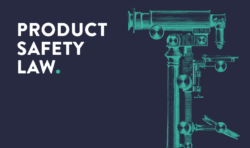A. The new EU General Product Safety Regulation (GPSR)
The GPSR has been in force throughout the EU since 13.12.2024 and has therefore not yet been in force for a whole month. At the same time, Directive 2001/95/EC (the General Product Safety Directive) was repealed. Enforcement of the GPSR is therefore still in its infancy. In this respect, it will be interesting to see how the market surveillance and customs authorities as well as economic actors (in competition law) will deal with the numerous unresolved legal issues that are currently being discussed. Examples include
- the requirements for the electronic address in the form of an internet address, e.g. in the context of manufacturer labeling in accordance with Art. 9 para. 6 GPSR,
- the sometimes difficult to fulfill online requirements for the sale of used products in accordance with Art. 19 GPSR,
- consumer communication in accordance with Art. 35 para. 4 sentence 1 GPSR, which aims to reach as many users as possible, or
- the still unresolved relationship between the GPSR and CE law from the harmonized area with regard to Art. 9 ff. GPSR, i.e. the obligations of economic operators.
It is more or less certain that the European Commission will not be of any help in this respect. In any case, it makes it too easy for itself when, in the recently published FAQs (see below), it again insists – without any justification – that the GPSR should not have a “gap-filling function” in relation to CE law with regard to the obligations of economic operators. Brussels still does not seem to have realized that this view leads to untenable results in the application of the law in several respects. And the unsuccessful demarcation formula in Art. 2 para. 1 GPSR permits an umbrella function of the GPSR without further ado, if and because only “the specific requirements of Union harmonization legislation” are to take precedence. Supporters of the “separation thesis” would still have to explain why, for example, there should be neither importer nor distributor obligations for machinery that are consumer products in machinery law since 13.12.2024 – obligations that existed without further ado until 13.12.2024 because the General Product Safety Directive has an umbrella function, Art. 1 para. 2 subpara. 2 lit. b) Directive 2001/95/EC. The Commission has also played an ominous role in the interpretation of the GPSR to date. In view of the wording of the relevant provision(s), it remains unclear why, for example, the requirement for an electronic address should only be fulfilled if the link leads to a contact form. Nevertheless, the (in this respect identical!) statements from the governmental sector – the central Central Authority of the Federal States for Safety [ZLS] and the nationally responsible Federal Ministry for the Environment, Nature Conservation, Nuclear Safety and Consumer Protection [BMUV] see it no differently – should be taken seriously, because experience has shown that they will have a strong influence on enforcement in the European Union (EU).
As the European Commission has so far contented itself with FAQs “EU General Product Safety Regulation” that are as thin as they are uninformative, the guidelines explicitly mentioned in the GPSR are still missing. Against this background, it is to be expected that the following guidelines will be issued in the near future, even though the GPSR itself does not set a deadline for the European Commission to prepare or publish them:
- Guidelines for economic operators with specific reference to small and medium-sized enterprises (SMEs), Art. 17 para. 2 subpara. 2 GPSR
- Guidelines for the practical implementation of the safety business gateway, Art. 27 para. 2 GPSR
The guidelines should also include a model template for technical documentation. Relevant drafts are available to us – they indicate that the European Commission would like to keep things rather simple and therefore industry-friendly in this respect. The fact that the model is not to be published until the GPSR came into force is, of course, in keeping with the image of an executive that has so far been of little help in ensuring legal certainty.
In this context, reference should also be made to the “Questions and Answers on the EU General Product Safety Regulation (Regulation (EU) No. 2023/988)” published by the Federal Ministry for the Environment, Nature Conservation, Nuclear Safety and Consumer Protection.
Finally, it is expected in the circles involved that the first impact for the purpose of concretizing the GPSR will be made nationally by the civil courts. This is due to the fact that the formal (labeling) requirements for marketability on the one hand and the information requirements for distance selling offers in general and online trading in particular pursuant to Art. 19 GPSR on the other hand provide fertile ground for genuine competition law attacks. This will presumably motivate some companies to take action against unwelcome competitors. Whether this will make a helpful contribution to the development of dogmatic structures for the purpose of better handling of the GPSR is more than doubtful in view of a whole series of, at best, strange civil court decisions on product safety law in the past.
B. Reform of the national product safety law
With regard to the GPSR, the national legislator was called upon to ensure an accompanying reform of the Act on the Making Available of Products on the Market (Product Safety Act – ProdSG) by 13.12.2024. After the ProdSG was only reformed in 2021 in order to adapt national product safety law to the EU Market Surveillance Regulation (Regulation (EU) 2019/1020) (which, of course, manifested itself in particular in the enactment of the Market Surveillance Act [MüG]), it is now necessary to synchronize the ProdSG 2021 with the GPSR.
However, the legislative process has actually stalled. The reason for this was the failure of the current coalition shortly before the GPSR was due to come into force on 13.12.2024. The relevant process was recently referred back to the committees (in particular the Committee on Labor and Social Affairs, the Committee on Economic Affairs and the Committee on the Environment, Nature Conservation, Nuclear Safety and Consumer Protection) because the FDP in particular expects “a smarter solution” from the new government that focuses on fewer “burdens for our companies” and more relief. The FDP is not least bothered by the high fines of up to EUR 100,000.00 for serious administrative offenses. Accoding to the FDP, this is too much, especially compared to Italy (EUR 50,000.00) and Austria (EUR 25,000.00) (see plenary protocol 20/202 of 04.12.2024, 26074 f.).
The ProdSG 2021 will therefore continue to apply until further notice, although it is now largely overlaid by the GPSR. The language for GPSR-specific information, instructions and warnings, which is provided for in Sec. 6 ProdSG-E, therefore remains unregulated. As is known, the planned regulation goes beyond Sec. 3 para. 4 ProdSG 2021. On the other hand, the fact that the numerous administrative offenses in Sec. 28 para. 2 ProdSG-E with reference to the GPSR have not yet been activated is positive for the industry. The continued application in areas that were not the focus of the reform legislator anyway is unproblematic. For example, the provisions on the GS mark in Sec. 20 ff. ProdSG 2021 is to remain virtually untouched, especially as this is genuinely national product safety law anyway. Non-harmonized B2B products, which admittedly rarely play a role, are and will continue to be measured against the ProdSG.
It remains to be seen whether the Committee for Occupational Health and Safety of the Federal States (LASI) will issue guidelines on national product safety law again after 2013 (3rd edition). Due to the declining importance of genuine national product safety law, this is unlikely to happen, especially as the LASI is likely to shy away from competing with the Commission in the interpretation of the GPSR. Nevertheless, this would be regrettable because the LASI guidelines are one of the tools in product safety law that actually offer added value because they are not only practical but also provide pragmatic solutions.
C. New EU toy regulation
The reform of European toy legislation was undoubtedly delayed recently after the process began on 28.07.2023 with the Commission’s proposal for a Regulation on the safety of toys (COM(2023) 462 final). However, it was recently reported from the government sector that the legislative process is nevertheless progressing. According to expert statements at the most recent market surveillance conference in Berlin, the new EU Toy Regulation should be ready for publication in the next two quarters.
The trilogue negotiations after the European elections did not start until fall 2024, after the Parliament in March and the EU Council of Ministers in May 2024 had determined their respective positions. In terms of content, the introduction of a digital product passport (DPP) will remain, which is intended to improve the possibilities of market surveillance authorities on the one hand and make it easier for consumers to access safety-related information (namely via a QR code) on the other.
As far as the DPP is concerned, there should not be several product passports – with a view to ecodesign regulation. Instead, a consolidation is planned in such a way that in future there will only be a single DPP for a single product.
D. Reform of national machinery law
After the new Machinery Regulation (hereinafter referred to as the “Machinery Regulation”) was published in the Official Journal of the European Union on 29.06.2023, work began on the new national machinery law. These efforts recently found expression in the German government’s draft bill for the revision of machinery legislation (BT-Drs. 20/14145).
However, the essential elements of the new machinery legislation will not yet have to be observed in the current year 2025. Instead, the general provisions or the obligations of economic operators will not come into force until 20.01.2027, Art. 54 subpara. 2 Machinery Regulation. In the future, national machinery law will focus on a law implementing Regulation (EU) 2023/1230 of the European Parliament and of the Council of 14 June 2023 on machinery and repealing Directive 2006/42/EC of the European Parliament and of the Council and Council Directive 73/361/EEC. We last saw comparable legislative techniques at national level in 2019 with the accompanying legislation to the European PPE and Gas Appliances Regulations, when the PPE-DG and the Gas AppliancesDG took to the stage. The Machinery Implementation Act (MaschinenDG) is intended to form Article 1 and thus the centerpiece of the underlying article law, which only consists of three articles.
The MaschinenDG will reflect the material scope of application of the EU Machinery Regulation (Sec. 1) and specify the German language in particular for the instructions and the EU Declaration of Conformity (Sec. 2). While Sec. 5 f. MaschinenDG deal with (relevant) market surveillance issues, Sec. 8 f. MaschinenDG regulate the provisions on fines (Sec. 8) and criminal penalties (Sec. 9). As usual, the criminal sanction provisions are unlikely to be of any practical relevance. However, there are currently no fewer than 25 (!) entries for administrative offenses, so that machine manufacturers in particular should take a look at the catalog in good time. Consequently, the start of application for the aforementioned Sec. 1 f., 8 f. MaschinenDG is set for 20.01.2027, Sec. 12 MaschinenDG. The fact that the 9th ProdSV (so-called Machinery Ordinance) is to be repealed with effect from 20.01.2027 follows from Art. 2, 3 para. 2 of the Article Law. The Machinery Ordinance, which is still valid until then, serves the purpose of transforming the provisions of Directive 2006/42/EC (the EC Machinery Directive) into national law. Due to the change of legal form in machinery law from a directive to a regulation, there will no longer be a need for national implementation of Union requirements in future. In this scenario, lean implementing provisions, which will be the subject of the MaschinenDG, are sufficient.
For further details: Schucht/Wiebe, EU-Produktsicherheitsverordnung. General Product Safety Regulation, 2025; Schucht/Wiebe, Die neue EU-Produktsicherheitsverordnung. General Product Safety Regulation (GPSR), 2024
Do you have any questions about this news, or would you like to discuss the news with the author? Please contact: Dr. Carsten Schucht







